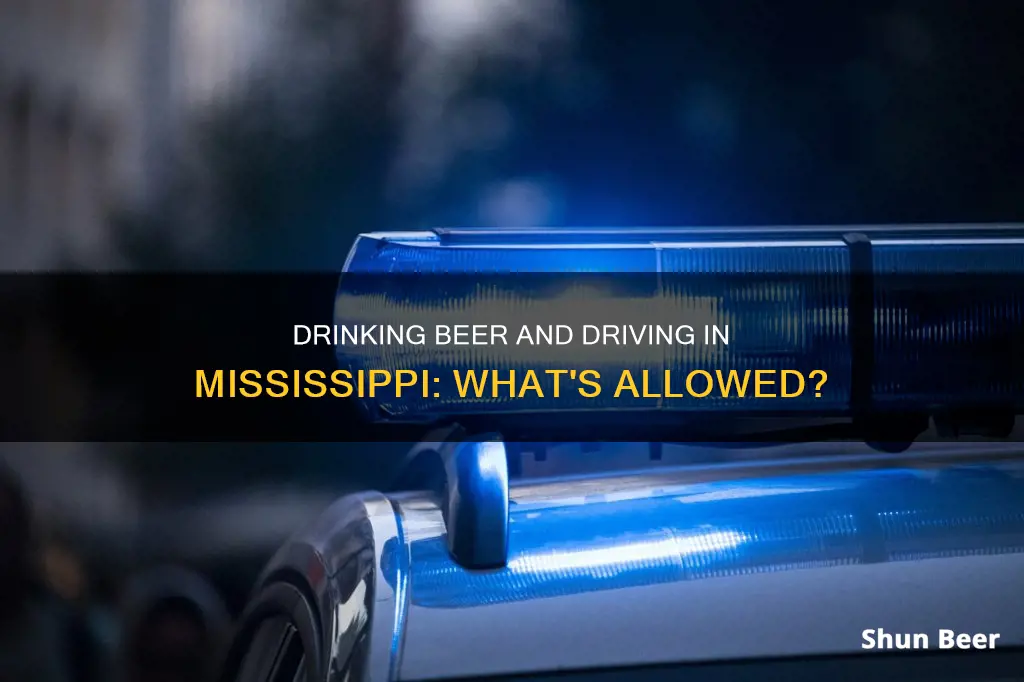
Mississippi has a unique history when it comes to alcohol laws. The state has no open container laws, meaning that, unlike in most other states, passengers are allowed to drink freely from open containers of alcohol in a motor vehicle. In Mississippi, the driver is also permitted to drink while driving, provided their blood alcohol content (BAC) remains below the legal limit of .08%. However, public intoxication is illegal in Mississippi, and those found to be intoxicated in a public place can be fined or face jail time.
| Characteristics | Values |
|---|---|
| Drinking and driving | Legal, as long as the driver's BAC is below 0.08% |
| Open container laws | No state-wide law, but some counties and cities have passed their own ordinances to ban the practice |
| DUI | Charged as "operating a motor vehicle under the influence" |
| First DUI conviction | Misdemeanor, punishable by 2 days in jail, $250 to $1,000 fine, 120-day license suspension, alcohol safety program, and vehicle impoundment until equipped with an ignition interlock device |
| Second DUI conviction | 5 days to 6 months in jail, $600 to $1,500 fine, one-year license suspension, substance abuse diagnostic assessment, completion of recommended treatments, and vehicle impoundment until equipped with an ignition interlock device |
| Third DUI conviction | One to five years imprisonment, $2,000 to $5,000 fine, three-year license suspension, substance abuse diagnostic assessment, completion of recommended treatments, and vehicle impoundment until equipped with an ignition interlock device |
What You'll Learn

Mississippi has no open container laws
Mississippi has some of the most relaxed alcohol laws in the United States. The state has a long history of supporting prohibition, only repealing its prohibition law in 1966. Even then, it allowed individual counties to continue to ban the sale of alcohol. It was only in 2020 that the possession of alcohol was finally legalised across all counties.
Despite this, Mississippi has no open container laws. This means that, unlike in most other states, it is not illegal for passengers to drink freely from open containers of alcohol while in a vehicle. In fact, Mississippi is the only state in which it is not expressly prohibited for a driver to possess an open container while driving.
However, this does not mean that drinking and driving is without risk in Mississippi. Firstly, if a driver is caught operating a vehicle with a blood alcohol content of 0.08% or above, they will likely be charged with driving under the influence (DUI). Secondly, if an officer sees a driver drinking, regardless of their level of sobriety, they are likely to be pulled over and questioned. Thirdly, some counties and/or cities may have their own prohibition against open containers, which could land a driver in trouble.
Therefore, while Mississippi has no open container laws, it is still wise to avoid drinking and driving, or driving with an open container in the vehicle.
The Magic of Bottoms-Up Draft Beer: How Does It Work?
You may want to see also

You can be charged with a DUI if you're over the limit
Mississippi's alcohol laws are complex. While there is no state law prohibiting drinking and driving, you can be charged with a DUI if you're over the limit.
Mississippi is the only state that doesn't have an open-container law prohibiting drivers or passengers from drinking inside a motor vehicle. However, some counties and cities have passed their own ordinances to ban the practice. The state has an abnormally high rate of alcohol-related traffic fatalities.
Mississippi law prohibits drivers from driving while under the influence of alcohol or drugs. It is considered drunk driving for a driver to have a blood alcohol content (BAC) of .08% or more. If you are arrested for driving under the influence, you can face serious penalties. The first or second DUI conviction a driver receives within five years is a misdemeanour, but the third or any subsequent offence in a driver's lifetime will be a felony.
The penalties for a conviction depend on the number of prior convictions and any aggravating factors. For a first offence, you may face two days in jail, a fine of $250 to $1,000, a 120-day licence suspension, an alcohol safety programme, and vehicle impoundment until equipped with an ignition interlock device (IID). For a second offence, penalties increase to five days to six months in jail, a fine of $600 to $1,500, a one-year licence suspension, a substance abuse diagnostic assessment, completion of recommended treatments, and vehicle impoundment until equipped with an IID. A third offence carries even harsher penalties, including one to five years of imprisonment, a fine of $2,000 to $5,000, a three-year licence suspension, and other requirements.
It is important to note that these laws may vary from county to county in Mississippi. While public drinking may be allowed in some areas, it is always illegal to be intoxicated on public transit in the state. Additionally, you can be charged with a DUI if you are over the legal limit, regardless of the specific county or city regulations.
How Sales Jobs Can Be Your Dream Career
You may want to see also

Public intoxication is illegal
Mississippi's alcohol laws are quite complex, largely due to the state giving local counties and municipalities the freedom to create and enforce their own alcohol regulations. While there is no law against public drinking in Mississippi, and no open container laws, public intoxication is illegal.
Mississippi's public intoxication law is known as "profanity or drunkenness in a public place". According to Miss. Code Annotated 97-29-47, it is unlawful to be drunk or use profanity in a public place in the presence of two or more people. A public place is defined as any space where you could reasonably expect your behaviour to be seen by others.
Public drunkenness is a misdemeanor, not a felony, but if convicted, you could face up to 30 days in jail and fines of up to $100. There may also be additional long-term consequences, such as impacting your ability to continue your education or live and work where you choose.
It's important to note that Mississippi's DUI laws still apply, so you will be charged with a DUI if you are over the legal limit. It is also always illegal to be intoxicated on public transit in Mississippi.
Public intoxication charges can be challenged and won, and it is recommended that you consult a qualified attorney to help you avoid a conviction.
Antibiotics and Alcohol: Safe After 12 Hours?
You may want to see also

Mississippi has a history of supporting prohibition
Mississippi has a long history of supporting prohibition, with a complex relationship between alcohol legislation and its enforcement. The state passed its first statewide Prohibition law in 1907 and was the first to ratify the Eighteenth Amendment, which prohibited the sale of alcohol across the US. The movement towards prohibition in Mississippi was driven by religious, economic, and racial arguments.
The efforts to limit alcohol began as early as 1833 with the Mississippi State Temperance Society, and more organized efforts emerged in the mid-1870s. The first successful restriction was a law from 1874, which required a license to sell alcohol, granted by a majority of registered voters and all women over fourteen in the area. The Anti-Saloon League and the Woman’s Christian Temperance Union (WCTU) became influential in the state's politics, advocating for local option laws and eventually statewide Prohibition.
Prohibitionists in Mississippi argued that alcohol led to self-indulgence, violence, and unstable homes. They also believed that limiting alcohol would create better workers and a more stable economic climate. Some white supporters of Prohibition, including Harriet Kells of the WCTU, claimed that drunk African American men posed a threat to white women. This rhetoric often focused on the purity of the white home and the dangers of African Americans in public spaces.
Mississippi had already enforced state prohibition for ten years by the time the Eighteenth Amendment was passed in 1919, and the state continued to be a leader in Prohibition enforcement. Despite the ban, alcohol was widely available, and its illegal trade inspired blues songs and literary characters, such as William Faulkner's Tommy, a bootlegger in his 1929 novel "Sanctuary."
In 1966, Mississippi finally repealed its statewide Prohibition law, becoming the last state to do so. The state's voters had previously overturned the repeal of Prohibition in 1934 and 1952, showing the strong support for Prohibition in Mississippi even after it was repealed nationally.
Old Beer: Is It Safe to Drink After Four Months?
You may want to see also

Local Mississippi laws vary from county to county
In Mississippi, you can drink while driving as long as your blood alcohol content (BAC) remains below 0.08%. However, local Mississippi laws vary from county to county, and there are some nuances to drinking and driving laws in the state.
Mississippi is unique in that it is one of only nine states where it is not illegal for passengers to drink freely from open containers of alcohol while in a vehicle. In most other states, open container laws prohibit passengers from consuming alcohol while the vehicle is in motion or parked on public property. Mississippi's more relaxed open container laws apply to both passengers and drivers, as long as the driver's BAC does not exceed the legal limit.
When it comes to the sale of alcoholic beverages in Mississippi, the laws can vary by county and municipality. There are currently 34 out of 82 counties in Mississippi that are completely dry for hard liquor sales, and 36 counties that are dry for beer and light wine sales. However, within these dry counties, there may be municipalities that allow the sale of beer. The laws regarding the sale of alcoholic beverages can be subject to local elections, with provisions in place for counties and municipalities to hold votes to determine whether to allow or prohibit the sale of alcohol.
Mississippi also has specific regulations for different types of alcoholic beverages. Beer, for example, is defined as a malt-based beverage with no more than 8% alcohol by weight, and it is regulated differently from distilled spirits and wine. Beer and alcoholic beverages are subject to excise taxes and sales tax in the state. Additionally, there are restrictions on where alcoholic beverages can be sold in proximity to schools, churches, and other designated areas.
While Mississippi's drinking and driving laws may be more lenient than those in other states, it is important to note that driving under the influence (DUI) is still a serious offence. The legal drinking age in Mississippi is 21 years, and minors found in possession of alcohol can face fines, community service, and suspension of their driver's license.
Cleveland's Best Breweries for Digital Nomads
You may want to see also
Frequently asked questions
Yes, Mississippi has no open container laws, meaning you can drink alcohol while operating a motor vehicle. However, it is illegal to drive if your blood alcohol content (BAC) is .08% or more.
If you're arrested for driving under the influence, you can face serious penalties. The first or second DUI conviction within five years is a misdemeanour, but the third or any subsequent offence in a driver's lifetime is a felony. The penalties for a conviction depend on the number of prior convictions and any aggravating factors.
The penalties for a first DUI conviction include two days in jail, a fine between $250 and $1,000, a 120-day license suspension, an alcohol safety program, and vehicle impoundment until an ignition interlock device is installed.
Yes, public intoxication is illegal in Mississippi. It is also illegal to be intoxicated on public transit. Additionally, individual counties and cities may have their own ordinances banning open containers in vehicles.







